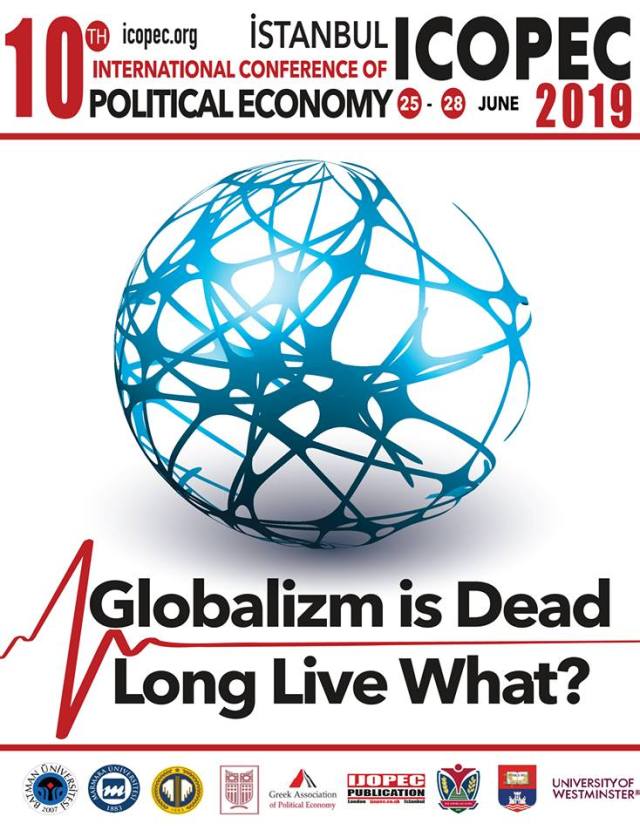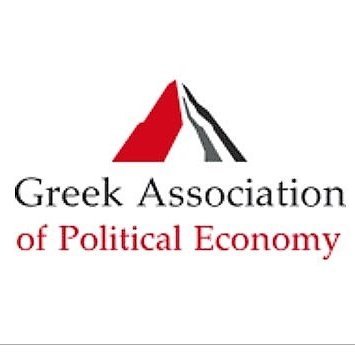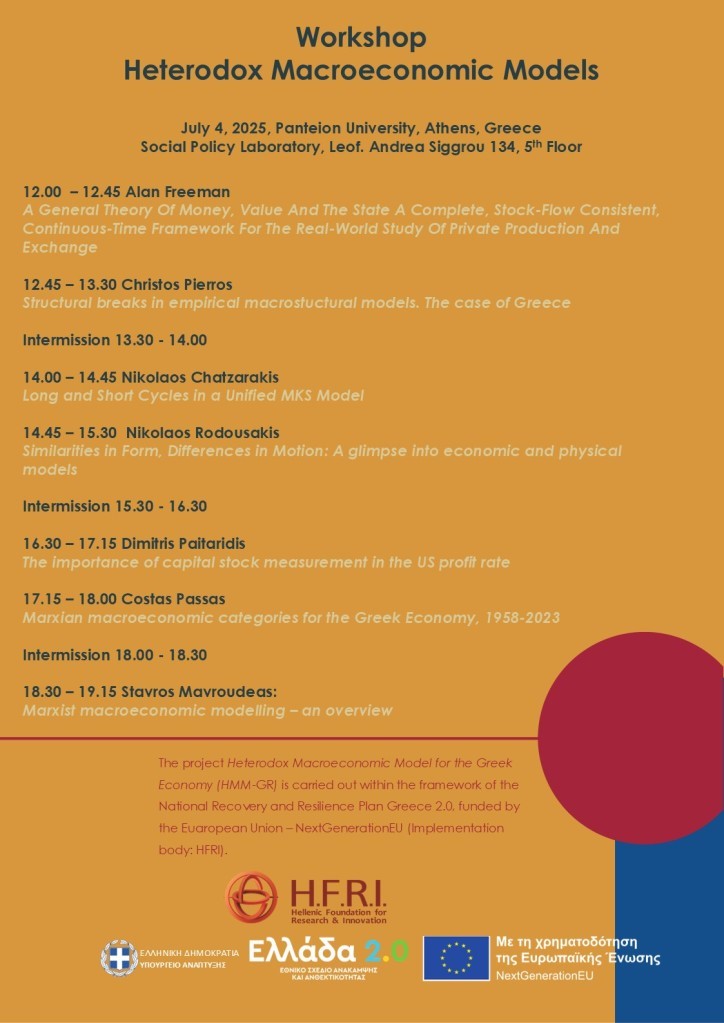ICOPEC 2019 CfP: If Globalism is Dead-Long Live What?
ICOPEC 2019 Call for Papers
«If Globalism is Dead—Long Live What?»
Istanbul 25-28 June, 2019
The Main Theme and Scope of the Conference
Globalization is characterized by a systemic interconnection in which what happens in one country affects all other members of the system. It is above all an economic process of interaction and integration, linked to social and cultural aspects. Until recently, it has been generally assumed that increasing the free flow of goods and services would lead to economic growth conducive to prosperity and peace, which would provide political support for increased economic integration. In developing countries, many see globalization as a positive force to free them from poverty.
Philosophical differences in the costs and benefits of globalization lead to a wide range of ideologies and social movements. Opponents of globalization argue that there is an inequality of power and respect in international trade between developed and underdeveloped countries. Criticism of globalization is usually based on discussions about the impact of such processes on the planet and the people. Others point out that, although globalization has led to the expansion of Western-style democracy, it has been accompanied by rising tensions, inequalities, illiberal politics, inter-ethnic violence, refugee crises, and crisis of global governance.
History has shown that globalization is not linear and can be reversed. In recent years, reactions against international cooperation have intensified, fueled by populist political leaders in many countries and citizens are less willing to let the market dictate. A collection of emotions (doubt, anger, fear, anxiety, frustration, and insecurity) that momentarily animates economic protectionism and identity politics across the globe. It is clear that at least a certain type of globalization is losing ground: the kind of globalization we have seen since the end of the 1970s. At the same time, cross-border exchanges of ideas are developing as never before. The development of digital technologies allows us to share information and ideas with unprecedented speed and unprecedented ease, which is like a double-edged sword can be positive, negative, or both in its impact. Therefore, the main question this conference seeks an answer to is whether globalism is dead or just on pause: It aims at examining the deeper-level root causes of the political economic problems of the world today, exploring and deliberating on the pressing question of what can be done about them.
Apart from its main theme, the ICOPEC 2019 also invites and welcomes all contributions that enrich the perspectives of Political Economy and expand the ground for better policy analyses and making. Indicatively, proposed papers may touch upon the following issues:
Global Economy and the 4th Industrial Revolution
- The End of Postwar Order?
- Political Economy of Globalization Discourse: Divergence or Convergence?
- The Rise of Protectionism and the Future of International Trading System
- End of Liberalism or Globalism?
- Current Controversies in Macroeconomics
- Trends and Challenges in Contemporary Economic Policy
- Neoliberalism and the New Macroeconomic Consensus
- Heterodox Economic Policies
- BRICS, the Newly Emerging Economies and the World Economy
- New Dual Economy: What is It and What to Do about It
- Strange Re-occurrence of Dual Economy in Developed Countries
- Financialization of Capitalism
- Political Economy of Money and Finance
- The Future of Global Economy in the Era of Fourth Industrial Revolution
- The Impact of Transition to Fourth Industrial Revolution on Ecosystem
- The Impact of Transition to Fourth Industrial Revolution on Efficiency and Competitiveness
- The Future of Work in the Era of Fourth Industrial Revolution
- The Future of Production and Labour Relations in the Era of Fourth Industrial Revolution
- The Future of Foreign Direct Investment in the Era of Fourth Industrial Revolution
- The Society and Politics in the Age of Artificial Intelligence
- Fourth Industrial Revolution and Education
- Fourth Industrial Revolution and Healthcare
Global Crisis, Local Voices
- Politics of Inequality and Income Distribution
- Inequalities across and within Individual Countries
- Political Economy Spillovers from Brexit and Other Political Shocks
- Political Economy of European Integration and Others
- The Crisis of Economics and the Economics of Crisis
- Economic and Financial Vulnerabilities of Developing Countries
- Poverty Alleviation, Inclusive Growth, and Sustainable Development
- Theories and Analyses of Economic Crisis
- Volatility and Contagion in Financial Markets
- Sovereign and Private Debt Crises
- Banks and Financial Markets in Times of Uncertainty
- Financial Intermediation and Financial Architecture
- International Organizations and Crises (IMF, WB, WHO, UNHCR, UN etc.)
- Monetary Policy Governance and Macro-prudential Issues
- Corporate Governance in Financial Institutions
- IMF and Structural Adjustment Programmes
Migration, Migration Policies, Demography, and Gender
- Refugee, Immigrant, and Minority Issues
- Globalisation and Migration
- Regional Shocks and Migration Flows
- Cross-Border Migration, National Identity, and Nation-State Interactions
- Immigration, Health, and Happiness
- Labour Migration and Migrant Workers
- Forced Migration
- Inequalities in Earnings and Employment
- Race, Class, and Gender
- Conflict, War, and Gender
- Gender, Aspirations, and Performance
- Political Representation and Public Leadership of Women
- Gender-Based Violence
- Gender Empowerment and Religion
- Gender Norms and Differences in Behaviour in the post-#MeToo Era
- Child and Forced Marriages
- Aging and Intergenerational Relations
- Demographic Economics
- Population Dynamics
- Big Data and Population Processes
- Demographic Dividends and Economic Development
- Social Pensions: Implementation and Impacts on Old and Young
Public Economics, Public Finance, and Public Management
- Global Public Goods
- Market Failure and Government Failure
- Liberalization, Privatization, and De-Regulation
- Crowding-in and Crowding-out
- Positive and Negative Externalities
- Public Goods and Public Bads
- Market-Society Tension and Social Policy
- From Minimal to Regulatory State
- Institutional Change, Governance and New Public Management
- Fiscal Rules and Constitutional Economics
- Shadow Economy and Corruption
- Fiscal Institutions, Taxation, and Economic Development
- International Tax Competition and Its Effects on Development
- Tax Non-Compliance and Under-Investment in Public Goods
- The Interplay between Monetary Policy and Fiscal Policy
- Public-Private Partnership and Development
Economic Development and Sustainability
- The Fourth Industrial Revolution and Development
- Institutional Quality, Administrative Capacity, and Development
- Late Development and Developmental State-Building, and Its Critics
- Trade and Industrial Policy for Development
- Static vs Dynamic Comparative Advantage
- Global Value Chains and Transnational Corporations
- Science, Technology, and Innovation Policies for Development
- R&D, Technological Capability Building, and Development
- Diffusion of Technology and Development
- Social Conflicts, Social Movements, and Development
- Rent-Seeking, Corruption, and Development
- Shared Economy and Inclusive Development
- Sustainable Development
- Global Warming and Environment
- Renewable Energies
- Green Buildings
- Challenges to Achieving Sustainable Development Goals
Labour Economics and Econometrics
- Productivity, Shocks, and Labour Adjustment
- Commodification of Labour Relations
- Labour Movement and Trade Unions
- Minimum Wage Impacts: Going Beyond Employment Effects
- Flexible Employment and Unemployment
- Labour Market and Employment Generation
- College Admissions, Supply of Skills, and Mismatch
- Job Types and Wage Growth
- Policy Alternatives for Improving Female Labour Force Participation and Career Choices
- Labour Market Discrimination and Gender Wage Gaps
- Wage Determinants and Dynamics
- Econometrics for Economic and Administrative Sciences
- Operational Research Methods and their Applications to Political Economy Issues
Business Management
- Crisis Management and Risk Management
- Market Liberalisation and Impact on Supply Chain
- International Business Environment and Entrepreneurship
- Mergers, Acquisitions, Restructuring
- Business Policies, Strategies, and Performance
- Manufacturing: Strategy, Technology, and Organization
- Supply Chain Management
- Lean Production and Total Quality Management
- Customer Satisfaction, Customer Loyalty and Retention Strategies
- The Emergence and Growth of Non-Bank Payment Systems
- Inclusive Business Models, and Social Entrepreneurship
- Sustainable Business, Production, and Consumption
- Consumer Attitudes to Ecological and Ethical Issues
- Knowledge Management and E-Business
- Information and Communication Technology and E-business
- New Entrepreneurship Dimensions (Sharing Economy, Freelancing, Self-Employment)
For more details about the venue, important dates and registration fees visit the ICOPEC website.




